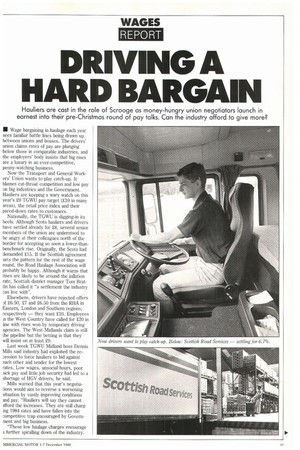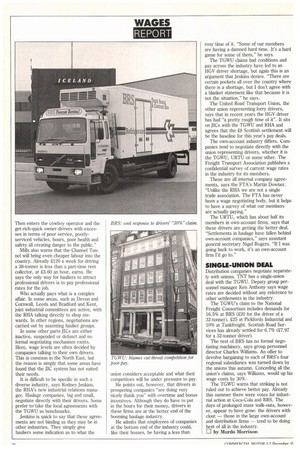DRIVING A HARD BARGAIN
Page 29

Page 30

If you've noticed an error in this article please click here to report it so we can fix it.
Hauliers are cast in the role of Scrooge as money-hungry union negotiators launch in earnest into their pre-Christmas round of pay talks. Can the industry afford to give more?
• Wage bargaining in haulage each year sees familiar battle lines being drawn up between unions and bosses. The drivers' union claims rates of pay are plunging below those in comparable industries, and the employers' body insists that big rises are a luxury in an ever-competitive, penny-watching business.
Now the Transport and General Workers' Union wants to play catch-up. It blames cut-throat competition and low pay on big industries and the Government. Hauliers are keeping a wary watch on this year's £9 TGWU pay target (£10 in many areas), the retail price index and their pared-down rates to customers.
Nationally, the TGWU is digging-in its heels. Although Scots hauliers and drivers have settled already for £8, several senior members of the union are understood to be angry at their colleagues north of the border for accepting so soon a lower-thanbenchmark rise. Originally, the Scots had demanded £15. If the Scottish agreement sets the pattern for the rest of the wage round, the Road Haulage Association will probably be happy. Although it warns that rises are likely to be around the inflation rate, Scottish district manager Tom Brattin has called it "a settlement the industry can live with".
Elsewhere, drivers have rejected offers 1 £6.50, £7 and £6.50 from the RHA in Eastern, London and Southern regions, respectively — they want £10. Employees in the West Country have called for £20 in line with rises won by temporary driving agencies. The West Midlands claim is still the pipeline but the betting is that they will insist on at least £9.
Last week TGWU Midland boss Dennis Mills said industry had exploited the recession to force hauliers to bid against each other and tender for the lowest rates. Low wages, unsocial hours, poor sick pay and little job security had led to a shortage of HGV drivers, he said.
Mills warned that this year's negotiations would aim to reverse a worsening situation by vastly improving conditions and pay. "Hauliers will say they cannot afford the increases. They are still charging 1984 rates and have fallen into the competitive trap encouraged by Government and big business.
"These low haulage charges encourage a further spiralling down of the industry. Then enters the cowboy operator and the get-rich-quick owner-drivers with excesses in terms of poor service, poorlyserviced vehicles, hours, poor health and safety all creating danger to the public."
Mills also warns that the Channel Tunnel will bring even cheaper labour into the country. Already 2120 a week for driving a 38-tonner is less than a part-time rent collector, at 23.60 an hour, earns. He says the only way for hauliers to attract professional drivers is to pay professional rates for the job.
Who actually pays what is a complex affair. In some areas, such as Devon and Cornwall, Leeds and Bradford and Kent, joint industrial committees are active, with the RHA talking directly to shop stewards. In other regions, negotiations are carried out by assenting haulier groups.
In some other parts JICs are either inactive, suspended or defunct and no formal negotiating mechanism exists. Here, wage levels are often decided by companies talking to their own drivers. This is common in the North East, but the reason is simply that some areas have found that the JIC system has not suited their needs.
It is difficult to be specific in such a diverse industry, says Rodney Jenkins, the RHA's new industrial relations manager. Haulage companies, big and small, negotiate directly with their drivers. Some prefer to'take the local agreements with the TGWU as benchmarks.
Jenkins is quick to say that these agreements are not binding as they may be in other industries. They simply give hauliers some indication as to what the union considers acceptable and what their competitors will be under pressure to pay.
He points out, however, that drivers in prospering companies "are doing very nicely thank you" with overtime and bonus incentives. Although they do have to put in the hours for their money, drivers in these firms are at the better end of the booming haulage industry.
He admits that employees of companies at the bottom end of the industry could, like their bosses, be having a less than rosy time of it. "Some of our members are having a damned hard time. It's a hard game for some of them," he says.
The TGWU claims bad conditions and pay across the industry have led to an HGV driver shortage, but again this is an argument that Jenkins denies. "There are certain pockets all over the country where there is a shortage, but I don't agree with a blanket statement like that because it is not the situation," he says.
The United Road Transport Union, the other union representing lorry drivers, says that in recent years the HGV driver has had "a pretty rough time of it". It sits on JICs with the TGWU and RHA and agrees that the 28 Scottish settlement will be the baseline for this year's pay deals.
The own-account industry differs. Companies tend to negotiate directly with the union representing drivers, whether it is the TGWU, URTU or some other. The Freight Transport Association publishes a confidential survey of current wage rates in the industry for its members.
These are all internal company agreements, says the FTA's Martin Downer. "Unlike the RHA we are not a single trade association. The FTA has never been a wage negotiating body, but it helps to have a survey of what our members are actually paying."
The URTU, which has about half its members in own-account firms, says that these drivers are getting the better deal. "Settlements in haulage have fallen behind own-account companies," says assistant general secretary Nigel Rogers. "If I was going back to work, it's an own-account firm I'd go to."
SINGLE-UNION DEAL
Distribution companies negotiate separately with unions. TNT has a single-union deal with the TGWU. Deputy group personnel manager Ken Anthony says wage rates are decided without any reference to other settlements in the industry.
The TGWU's claim to the National Freight Consortium includes demands for 16.5% at BRS (£20 for the driver of a 32-tonner), E25 at Pickfords industrial and 10% at Tankfreight. Scottish Road Services has already settled for 6.7% (7. 97 for a 32-tonner driver).
The rest of BRS has no formal negotiating machinery, says group personnel director Charles Williams. An offer to devolve bargaining to each of BRS's four regional subsidiaries was turned down by the unions this autumn. Conceding all the union's claims, says Williams, would up his wage costs by 30%.
The TGWU warns that striking is not ruled out to achieve better pay. Already this summer there were votes for industrial action at Coca-Cola and BRS. The days of prolonged mass walk-outs, however, appear to have gone: the drivers with clout — those in the large own-account and distribution firms — tend to be doing best of all in the industry.
by Murdo Morrison














































































